TRANSCRIPTION
Where were you born?
I was born at Colgins Hospital in Waco, Texas.
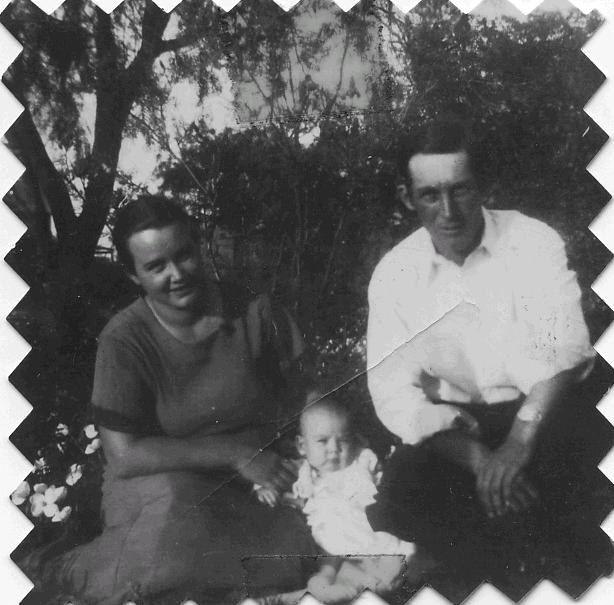
Was Waco as big then as it is now?
No, Waco was a very small town at that time. Had the one little tiny hospital which doesn't of course exist today either. Now they have two major hospitals. It's a big town.
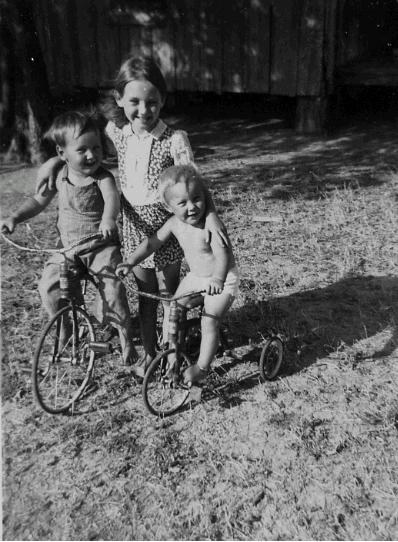
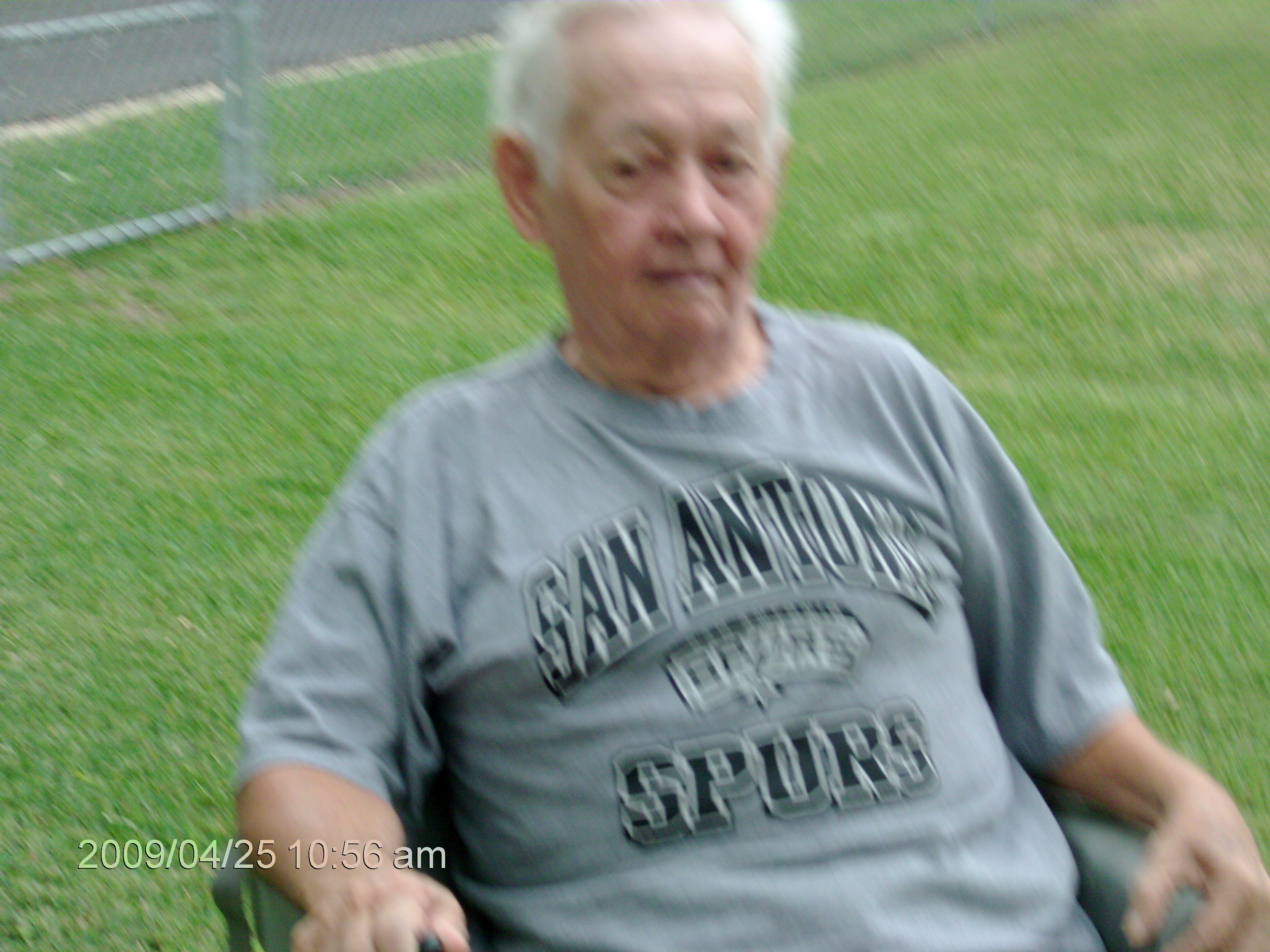
When you were a kid, what kind of things did you do, like when you were in grade school or even before grade school? What did you do for fun?
We lived out in the country and we had just the normal things other kids had. We had horses. We had bicycles, several. Went to a, well this maybe a little too quick but, we had, it was a very small town. It had two streets and but we actually lived about a mile out from the little town of Leroy. Went to school at Leroy when I started to school. It was a four room school house, it was a red brick school house - had four big rooms and each one of the teachers in a room taught like two or three grades in the same room. Like they taught to the eighth grade and as I said, it had four rooms, so it was divided - let's see, I think it was first, second - first, second - third and fourth - fifth and sixth - seventh and eight, divided into the four rooms.
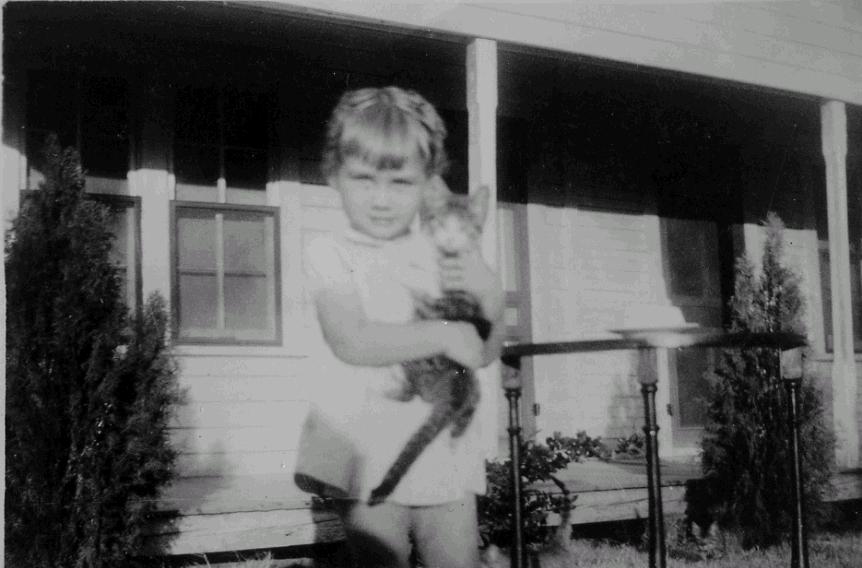
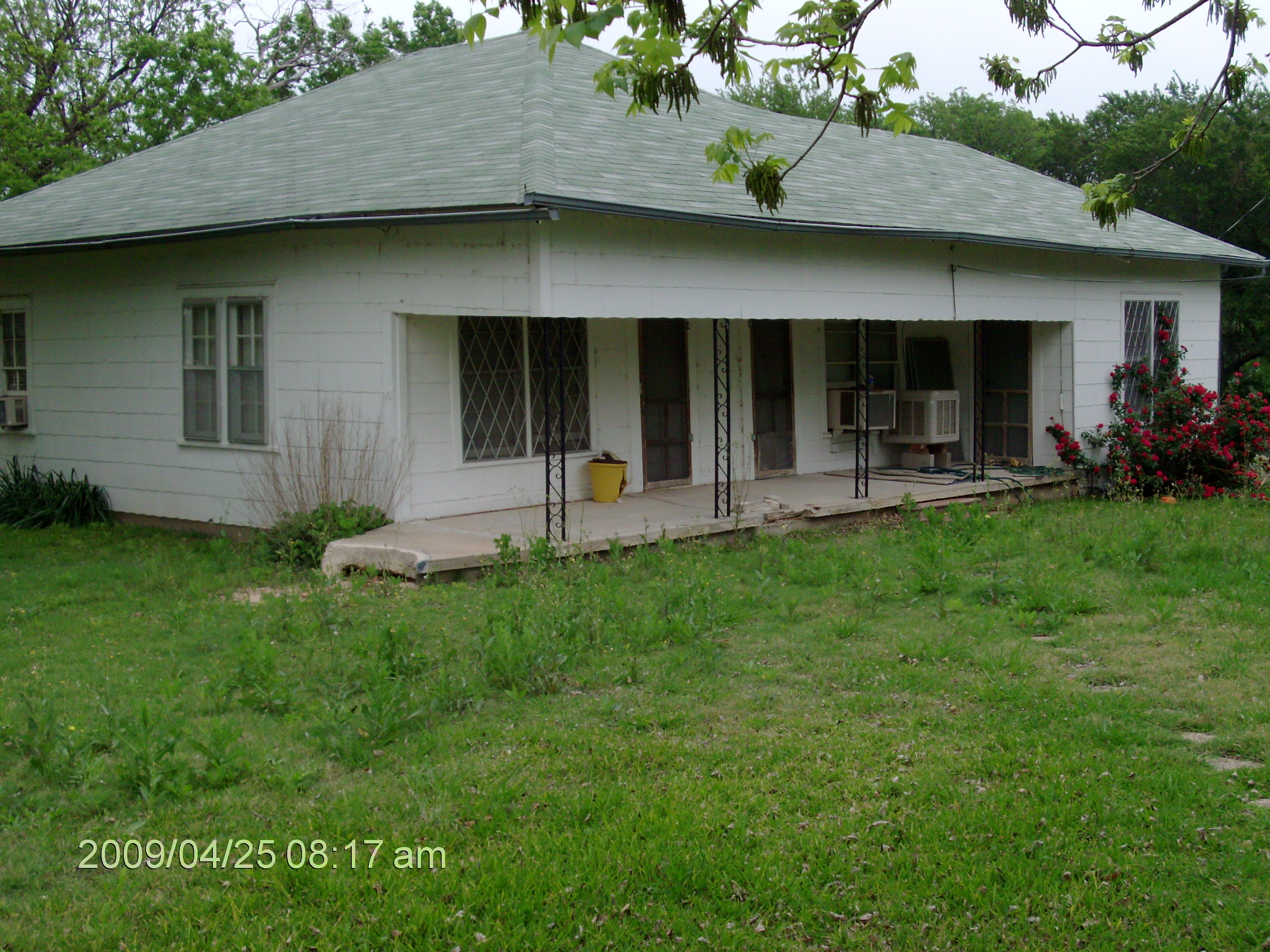
What was going on when you had your picture taken in Aunt Euna's front yard?
Oh that little...Matter of fact, I have that table today, and it's out there in the garage. That was on my third birthday and I was standing out in the front yard and they brought my birthday cake out there and put it on that table to make the picture and everything.
Did your family always have indoor plumbing and electricity?
Actually whenever I was real small we had electricity but we did have not indoor plumbing.
Do you remember when you got your first bathroom in the house? Did you like it?
We actually had an outhouse out behind the car shed that you had to go out to and all definitely did. Actually as far as truly remembering when, I do not remember when or anything like that.
Do you think it was easier back then or harder?
Well, let's put it this way, in that day and time, I won't say it was harder. I will say that you learned something because the teacher made darn sure you learned it. That weren't teaching to a test, they weren't teaching to a 'I will look good situation', they were teaching you were going learn to read, write, your going to learn your math, so you had to learn.
Was your high school segregated?
When I was going to high school, actually yes, when I started to high school at West there was a white school and a black school and I guess I had been going to high school at West about…maybe the first year and they combined the two schools and Professor Robinson, who was the head of the black school, came over to the school after it was combined with his people and he said "I was I am not about to leave my kids over here with these other people and me not take care of them" and I guess probably Professor Robinson was one of the nicest people I have ever met. And of course, the scenario was that probably 15 or 20 of his kids that he had at his black school were kids from Leroy which I had lived next door to all of my life so, to me, it was nothing, uh there was a little bit of flack for a little while but it really didn't last long and then it became -hey, this is a great bunch of people so let's make them our people so then the school, those kids came in and just became part of it and the school really did great as a consolidated school, a non-segregated school.
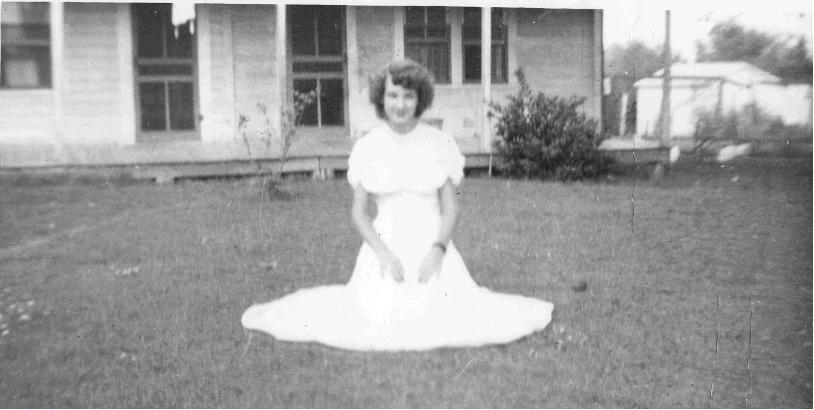
Why were you wearing the formal gown?
Yes, the formal was graduation, when I graduated from high school. It was in 1953.
When you got to high school, did you have to work?
No, I didn't work when I was going to high school.
Right after high school, did you go straight to college or what happened then?
No, when I got out of high school, I went to work and got married and then started taking classes in college. I started going to Hill Junior College, driving the 25 miles to Hillsboro a couple a nights a week and took a couple of night classes along and then when MCC opened, I started going to MCC a couple of nights a week until I got my first two years and then I transferred over to Baylor.
What year did Mclennan Community College open?
Oh, I do not remember exactly in what year that it opened. Don't remember exactly when it opened. But, you know it's been like….it was a long time ago.
Were there any negative influences about you going to school, being a lady? Did anyone think you shouldn't go to school and you should be a wife?
No, no, no, my mother and daddy would have croaked, even if I thought about quitting school.
When did you decide to get your masters degree and why?
Well, actually what happened, the reason I got a Master's degree was I went to work for CertainTeed Corporation and the guy that I worked for, Mr. Malloy, had four people in his office and I was the only female in his office and he was paying the men about three times what I made and I didn't have a bachelors at that time and he said, "I think it's time for you to get off of it and get a bachelors degree so I can at least get you close to what these guys make. You're doing twice the work that they're doing, so why shouldn't you be paid" and he was the tilting factor that got me to finish up and get my bachelors. Well, when I got my bachelors and everything and all is well and etcetera, and what not, Rudolph and I were sitting right here at the very table you and I are sitting at right now and I said, you know, it would be nice to have a masters. He says, "You've gone as long as you would go. You wouldn't do it." Well he shouldn't have said it. That was it.
What kind of obstacles did you have to overcome in the workforce because you were a woman?
Well, I always got paid less than the guys did. I was expected to do about twice the work the guys did and virtually, did the work that they didn't want to do.
Would you have made more money if you would have been a man?
Oh yes. As a matter of fact, even after I had gotten my degrees and everything, the men in the offices that I worked in, made an easy 15 thousand dollars a year more to 25 thousand more than I made.
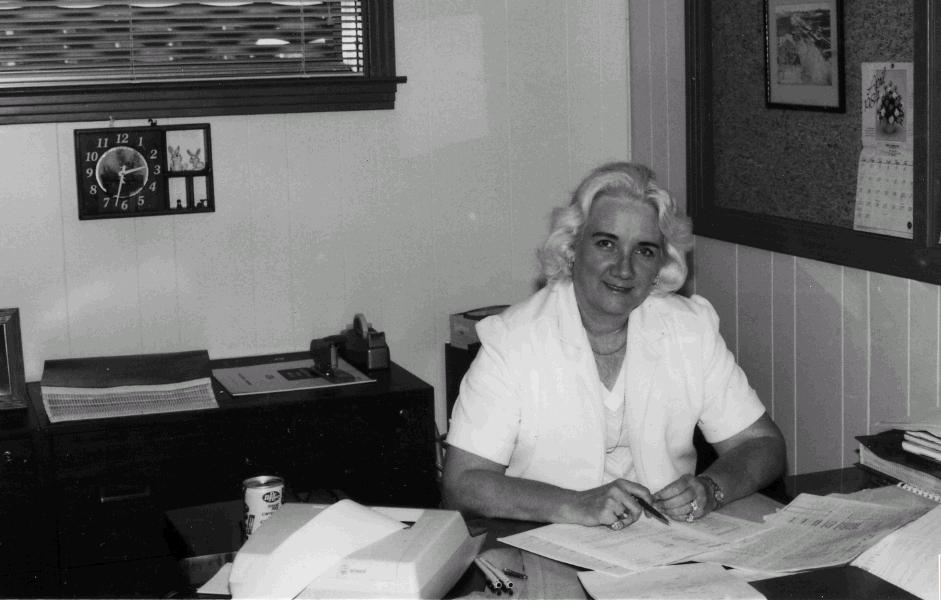
Who were you working for in the office picture?
That was, yes I already had my masters at that point in time. Where that office was, that was my office after I got my masters and I was considered the Assistant Controller for CertainTeed Corporation in Waco.
Do you have any advice for young women going to college?
I would tell them to get every bit of the education possible and don't just stop with their bachelors degree. Keep on it if at all possible.
Do you remember when the railroad closed down? Did that happen while you were going to school or before?
Oh no, no. The railroad closed down going through Leroy whenever I was, so, about fifteen, sixteen, something like that. It a …because when I was eight-nine to ten years old, I would ride the train from Leroy to Fort Worth to my aunts and she would pick me up at the train and put me back on the train with the conductor, she would tell the conductor, make sure she gets off at Leroy and I would come home. Just like a bus.
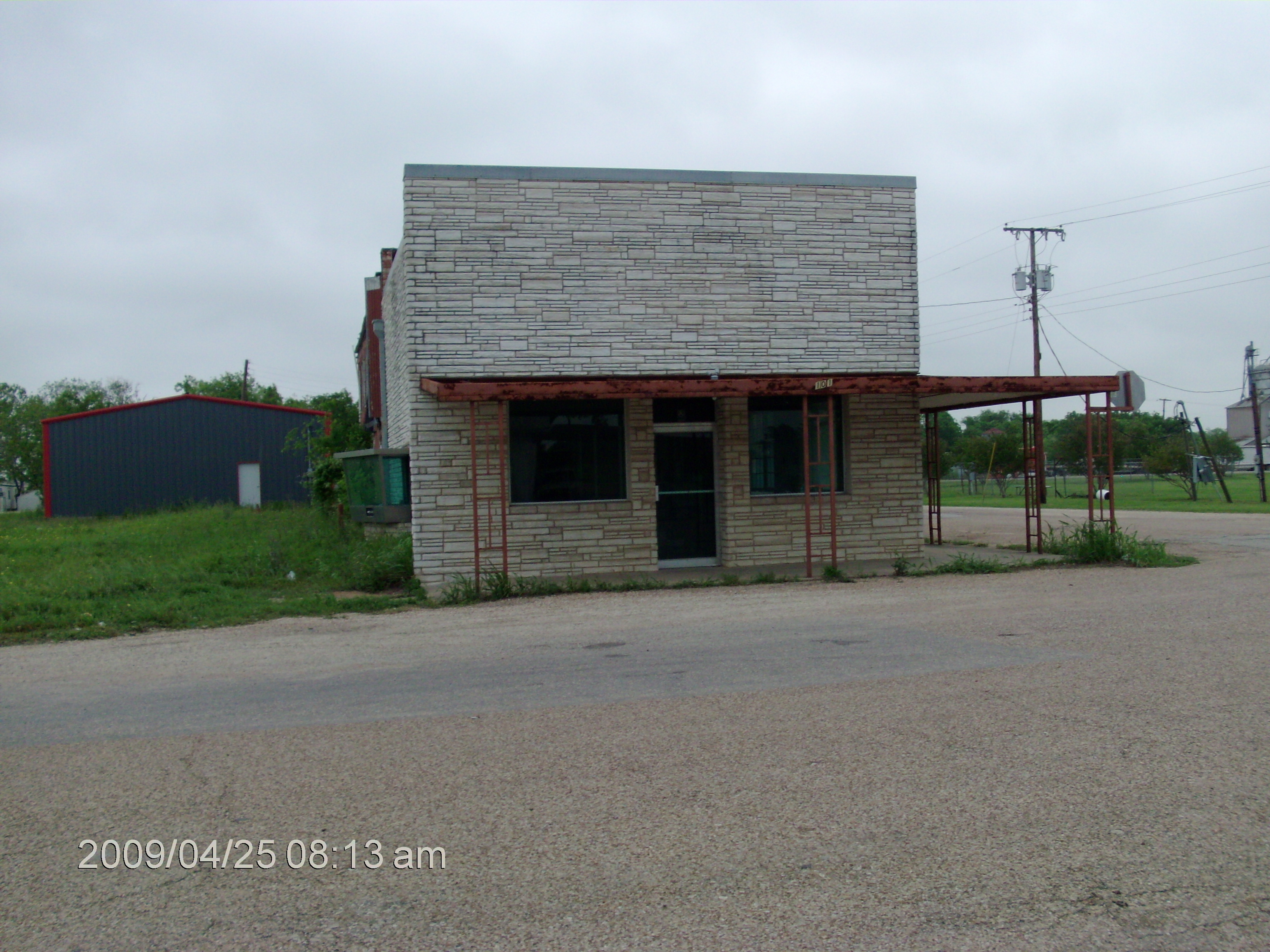
When the Leroy bank closed dowm, did that affect you personally in any way?
I did not have an account at the Leroy bank, but my mother had an account at the Leroy bank and lost about 3 thousand dollars when it closed down and my father-in-law had always had money at the Leroy bank but he had passed away and we had already taken his money out of the bank. We would have lost all of it.
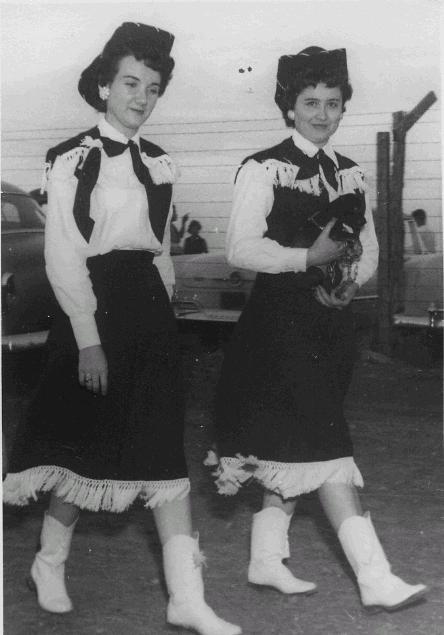
What is the cowgirl uniform about?
Me and another cowgirl… (laughs). That was…I was about, probably about 18 years when that was taken and those outfits, those were black and white outfits and we got the hats, with the boots, everything and all that fringe and what not. We made those cowgirl outfits-the lady, the gal that I was with Mildred Alewine and I made those outfits. And we made those special because Rudolph & Carl had said we're going to the Dublin rodeo and we said well we don't want to go in just in like jeans and what not so we sat down and made those outfits.
Did you make uniforms for the guys too?
No, just us.
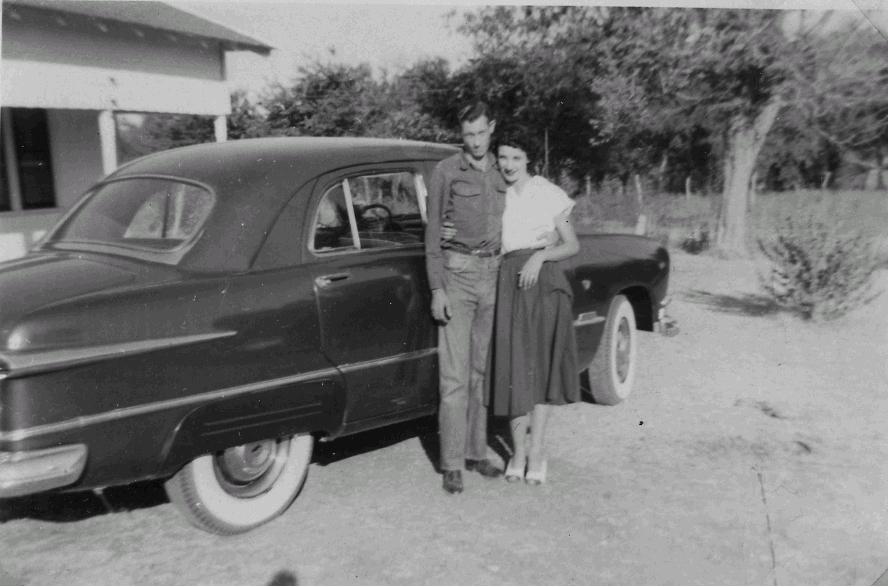
Can you tell me about the car Rudolph is leaning against?
That was, I am almost positive that the car that is in that picture is a 51 Ford that he bought before we got married and it was a real dark maroon color, a real pretty car. Because he had a 47 Chevrolet which was the sharpest little car that you ever laid eyes on. Matter of fact today there is one up on an antique car lot up on I-35 that every time I drive by there I think I want that car. But of course I couldn't touch it forever. But anyway, I think that picture was taken the day he brought the car out to Leroy to show, "look what I bought, oh yea, I got this car, this will be so neat for us to have".
How did you meet Rudolph and what kind or length of courtship did you two have?
Okay, I met Rudolph through his sister. I went to school with his sister and met him through his sister and actually I dated his brother before I dated him because Charlie Ray was a lot closer to my age and uh, actually I wouldn't even call it dating. He would come over and he would say "Hey, I am going to ride around for an hour or two, you want to go?" And of course, I would go riding just out in the country side, riding around and he would bring me back by home, that's uh and then I met Rudolph. At the time, Rudolph was engaged to somebody else when I met him. And anyway just had been friends, you know, with his sister and his brother and all. Then, a year or two on down the road and he started coming over to the house because he had broken up and he said hey go to the movies with me do this and it just started out like that and ended up several years down the way ended up married to him.
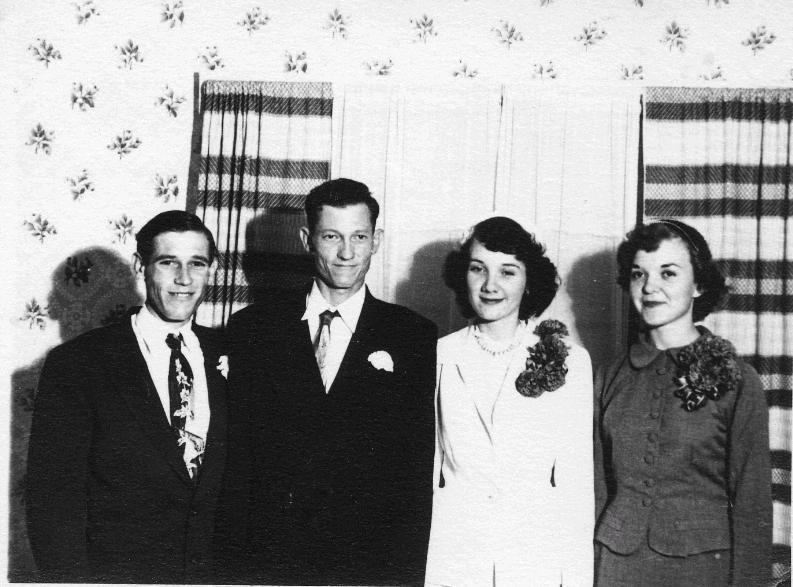
What is the picture about with you wearing the corsage?
Okay, those were our wedding pictures and those pictures were taken in my grandmother's living room, we were married in her living room with the couple that stood up with us. That was my best friend and Rudolph's brother.
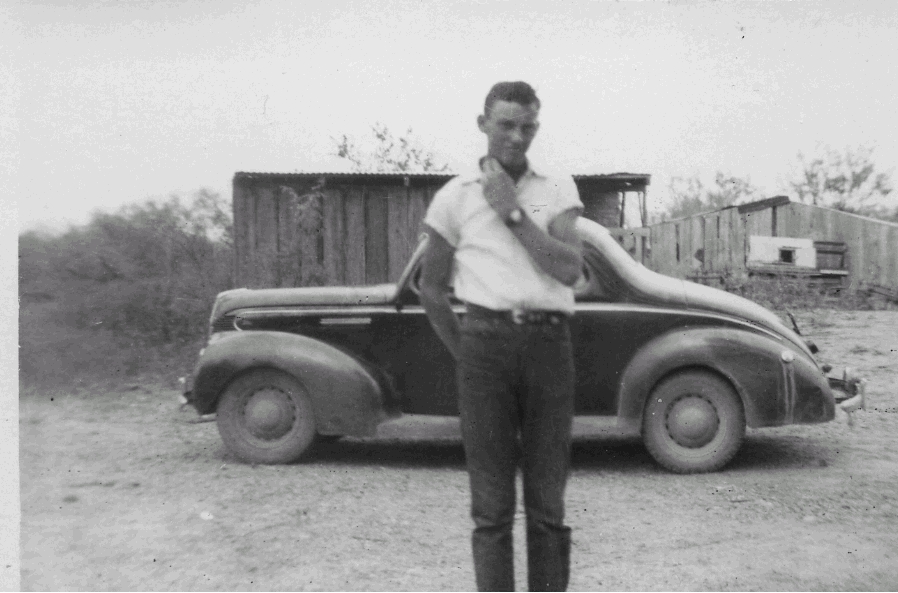
When you and Rudolph got married, did you feel like you were better off or just transitioning through?
I would say more just transitioning through because Rudolph was just like I was, just a poor farming family and we both had to work for a living and have worked ever since. He worked all of his life just really, really hard.
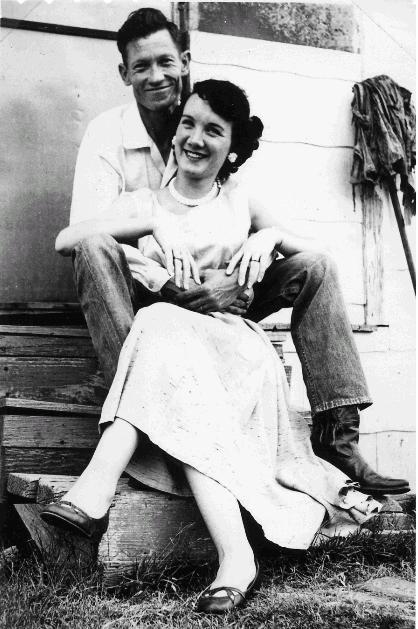
Who's house steps are you two sitting on?
Okay, where we're sitting on the back steps? That was my grandmother's house and that was, actually we were dating at that time. That was made before we were ever married.
Is there anything else you would like to add to this interview?
Well actually, with regard to me, I don't think I would be where I am today if I had not worked as a kid and when I say worked I mean picked cotton in the fields and what not because Dad was a farmer. I had to go to school and as soon as I got out of school went to work and realized that Rudolph and I both had to work real hard to go anywhere and did that and all I can say is that if you really want something, get out there and get it, work for it.

